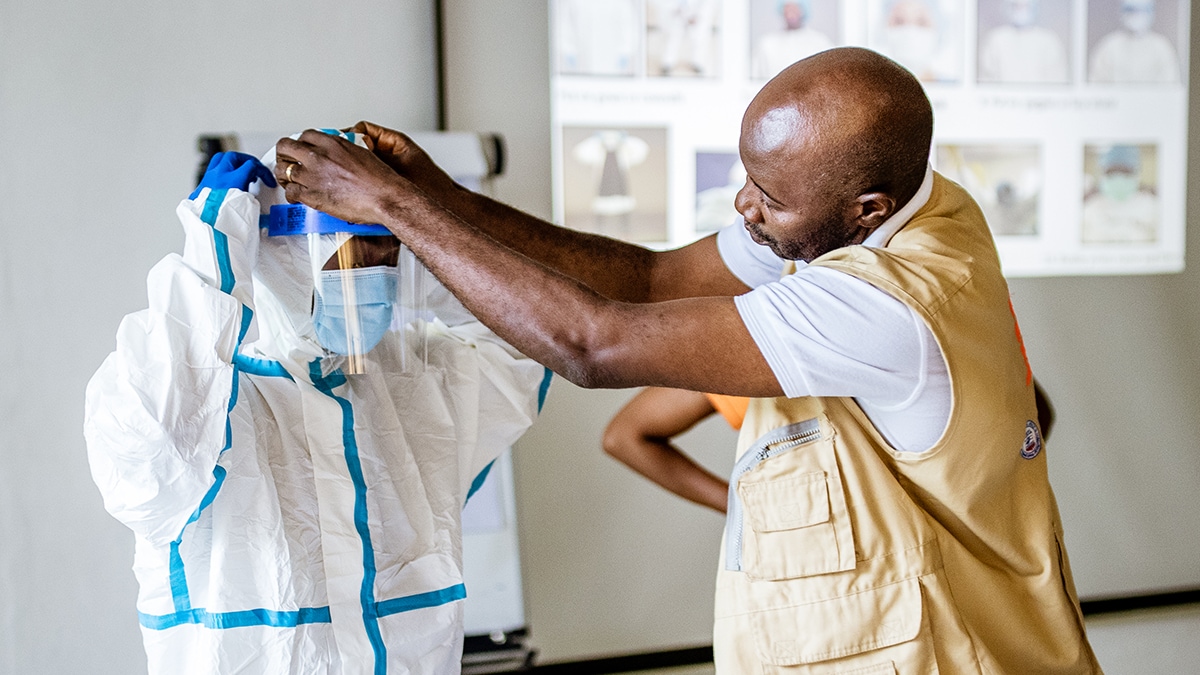Key points
- CDC works with partners globally to combat healthcare-associated infections (HAIs).
- In Sierra Leone and Ethiopia, CDC and partners are training infection prevention and control (IPC) professionals, who are critical for reducing HAIs and improving patient and healthcare worker safety.
- As of spring 2024, 79 healthcare workers have completed the IPC training and are implementing IPC activities in a variety of healthcare settings.

The critical role of infection prevention and control professionals
Experts are working together to bring down rates of healthcare-associated infections (HAIs) in low- and middle-income countries, which can be at least 3 times higher than those in high-income countries. Healthcare professionals trained in infection prevention and control (IPC) are critical to reduce HAIs and improve patient and healthcare worker safety, but many healthcare facilities in low- and middle-income countries lack trained IPC professionals.
CDC and ICAP at Columbia University collaborated with partners in Sierra Leone and Ethiopia to develop and establish IPC training programs. These programs aim to equip IPC professionals with the knowledge and skills needed to effectively implement IPC programs in a variety of healthcare settings.
Sierra Leone
During the 2014–2016 Ebola outbreak in West Africa, the Sierra Leone Ministry of Health (MoH) recognized the need for trained IPC personnel and appointed and trained healthcare professionals to become IPC staff at all district hospitals. Following the outbreak, the Sierra Leone MoH requested assistance from U.S. CDC to develop and implement a comprehensive training program for IPC professionals.
This request led to CDC’s collaboration with ICAP, Sierra Leone MoH, the World Health Organization, and Infection Control Africa Network in 2017 to develop Sierra Leone’s IPC training program, named the Sierra Leone Advanced IPC Certificate Course.
ICAP led the development of the competency-based curriculum, a 6-month course that combines classroom learning with hands-on training. Program participants receive mentorship from Sierra Leone MoH, CDC-Sierra Leone, ICAP and other local partners throughout the program.
The course officially launched in 2019 and 60 healthcare providers have graduated across three cohorts (10 from the national level, 15 from districts, 35 from health facilities). The majority of graduates (70%) continue to work as IPC focal points – healthcare workers responsible for implementing IPC measures – at the national, district, or health facility level or hold other IPC roles. These graduates have played pivotal roles in implementing IPC activities across all health system levels including:
- Being actively involved in the national IPC program (88% of national IPC unit personnel are training program graduates), which plays a vital role in overseeing implementation of national IPC guidelines to ensure healthcare safety.
- Teaching classes in the Advanced IPC Certificate Course and providing one-on-one mentorship to new trainees in the program (30% of graduates have taught or mentored new program trainees).
- Participating in emergency response teams to develop and implement effective IPC strategies during outbreaks such as Lassa fever and COVID-19.
Ethiopia
Using knowledge gained from Sierra Leone’s Advanced IPC Certificate Course, CDC and ICAP began work in February 2023 with partners in Ethiopia, including the Ethiopian MoH and Saint Paul’s Hospital Millennium Medical College, to implement a similarly structured 6-month program known as the Infection Prevention and Control Advanced Training Program or IPCAP.
The hands-on learning projects were adapted for Ethiopia’s current priorities, including microbiology, injection safety, and HAI surveillance. Members of the National IPC Program at the MoH, CDC-Ethiopia, and other IPC professionals in Ethiopia mentored the trainees throughout their field work.
The first cohort of 19 trainees in Ethiopia graduated in October 2023. The trainees were IPC focal points from 16 different healthcare facilities and 3 Regional Health Bureaus (RHBs). IPC focal points from healthcare facilities with ongoing collaborations with the National IPC Unit were prioritized for the first training cohort.
Although in early stages of implementation, the recent graduates of IPCAP continue to serve as IPC focal points at healthcare facilities and RHBs where they are now leading quality improvement projects and implementation of HAI surveillance per the national protocol.
Sustaining success
The third cohort of Sierra Leone’s Advanced IPC Certificate Course was delivered in partnership with Njala University. Sierra Leone MoH is now exploring the possibility of expanding course delivery to other local universities to meet demand and improve sustainability. Ethiopia’s MoH is also identifying opportunities to sustain the IPC training program.
Learn more about what CDC and partners are doing globally to monitor and prevent HAIs.
